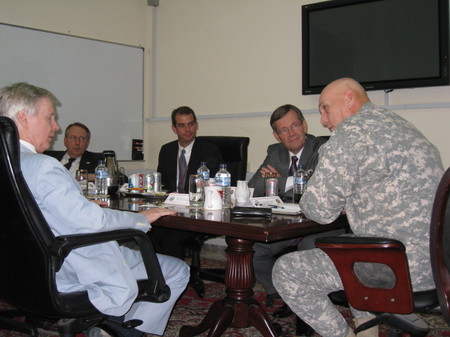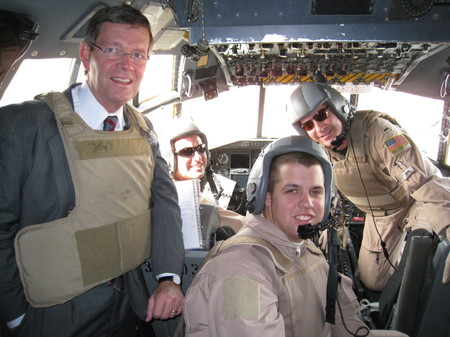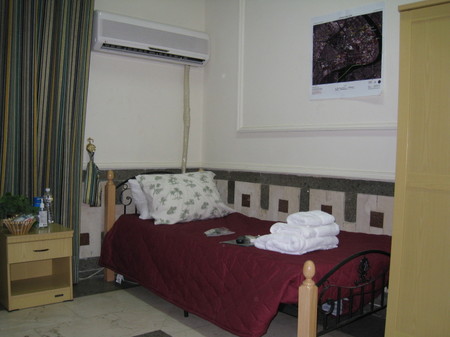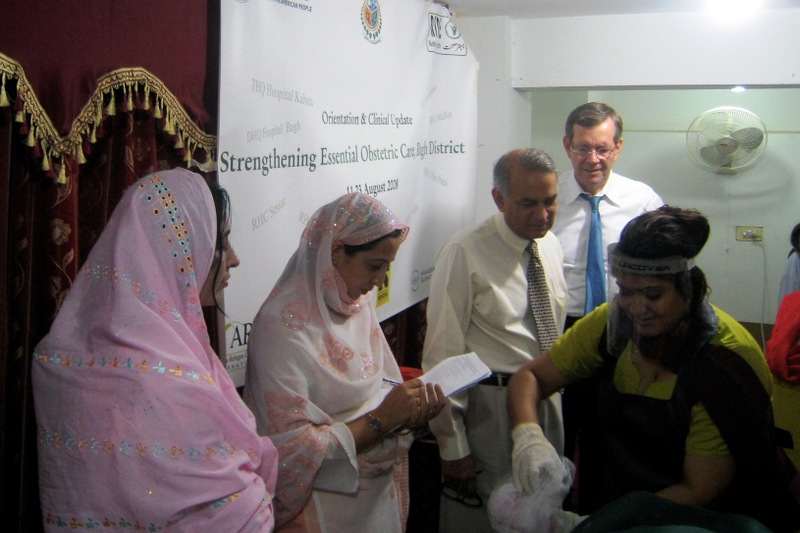Iraq Blog III
An Iraqi Agenda for Health-System Improvement
Yesterday, I related how terrorist and sectarian forces in Iraq have used tactics right out of the insurrectionist’s handbook to target and disrupt health care. They have done this knowing that few things discredit the legitimacy of a struggling democracy better than the discontent surrounding a lack of health care.
Today, I will tell about some of the things the United States is doing to help the new Minister of Health to re-establish health care in his country. Victory here is essential to allowing the people of Iraq to feel confidence in their new Government. Health is so personal it transcends nearly every other service in this way.
I reported in yesterday’s blog that thousands of Iraqi doctors have fled the country. Dr. Salih’s first priority has been to persuade them to return. The most obvious thing that had to happen for that to occur was for the security situation to improve. The progress in this area has been widely reported in the media. I saw evidence of that mainly in the discussions I had with health providers. They feel it is safer now.
Once doctors feel their physical safety can be assured, the next step is to tackle some very difficult compensation issues. Officials at the Ministry of Health told me doctors within their public health-care system were being paid as little as $3.00 a day. The result is corruption. They can’t live on that amount, so they are forced to resort to other means.
Like almost every socialized system in the world that promises health care for all, two systems end up operating. Doctors work in the public system in the morning, and in the afternoon they practice for themselves on the side. Doctors will then try to steer patients to their private practice where they can accept payment for services and medication. In some cases the doctor may have lifted the medication from the public supply.
Incidentally, this is the big lie of socialized medicine. The waiting lines created by rationed, “free” care end up overflowing into a private system where people have to pay to actually get care. (A subject for another day.)
Minister Salih has succeeded in increasing salaries for doctors by $2,000 to $3,000 a month over what they were previously paid. He is increasing training programs for doctors and support staff. That is having an impact.
No new hospitals have been built in Iraq for the past thirty years. Hospitals suffer from bad infrastructure, and from defective water systems, inadequate electricity, unsafe sewage systems and other problems. The buildings are old and worn, and need lots of repair work.
The World Bank (to which our country is the largest contributor) will soon execute a grant to build six to seven new teaching hospitals. The United States has been helping directly to develop better facilities. So far, the U.S. Agency for International Development has paid to build more than 136 primary-care clinics and small hospitals around the country. We’re also helping them build a big children’s hospital in Basrah.
The reality of the staffing problem confronted me when I found out that, because of staffing shortages, several of the new clinics are not open yet to the public. They are equipped and ready, but there are no people yet to man them.
Fortunately, there is some good news to report there. In the last year, more than 800 of the doctors who left have returned to Iraq. There are thousands more that are still away.
As a result of this trip, we at HHS are instituting a number of additional measures that I hope will help. I will detail those in a future blog.
The bottom line for me was that Dr. Salih, despite working with impossibly difficult conditions, is making progress. He is one of many heroic figures I have encountered who risk their lives to do this service.
There are thousands of Americans doing the same thing. One American I would like to acknowledge in this category is my Health Attaché in Iraq, Dr. Terry Cline. He follows three others who have served in the same position, CDR Bruno Himmler, Dr. Jon Bowersox and RADM Craig Vanderwagen.
The Health Attaché represents the Department at the U.S. Embassy in Baghdad. Their job is coordinating all our activities in the country. He is our player-coach on the field.
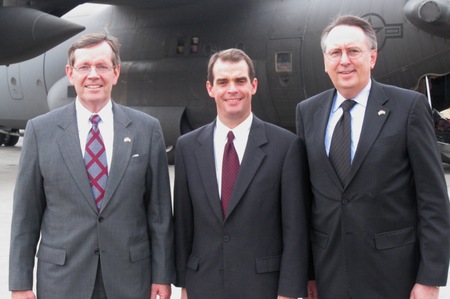
Secretary Michael Leavitt, Health Attaché Terry Cline, and Chief of Staff Rich McKeown
It was clear to me that Terry has built great relationships of trust, with the Health Ministry and others within our Embassy. He is making a serious impact.
Dr. Cline was the Administrator of the Substance Abuse and Mental Health Services Administration (SAMHSA) at HHS. He volunteered to do the job, and, while it was hard to lose him in that job, it was clear to me he felt a passion for going to Iraq.
Spending time with him in Iraq reminded me of the sacrifice our soldiers and diplomats make, voluntarily, and how fortunate we are that they are willing to do so.
One last observation about my first day in Baghdad; it was Sunday, and I had hoped I could find a church service to attend. In the evening, somebody told me about a Spanish-language congregation that held a late meeting. I found myself in Baghdad, Iraq, worshipping alongside Spanish-speaking soldiers and contractors, mostly from Perú. An interesting way to finish the day.

